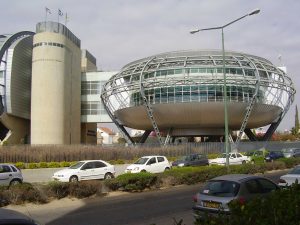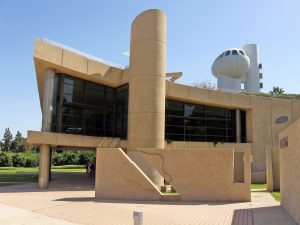German-Israeli cooperation in the sciences and joint research is an ongoing success story – and has also helped pave the way for friendship on the political and personal level. Germany is now considered Israel’s most important research partner in Europe, second worldwide only to the U.S. Together, we are embarking on new challenges. Find out more about exciting future partner projects…

Shamoon College of Engineering in Beer Sheva
/ (CC BY 2.5) / https://creativecommons.org/licenses/by/2.5/deed.en
With our German-Israeli Accelerator, we are combining the strengths of Israel as a cybernation with the excellent and application-oriented research of Fraunhofer,” said Reimund Neugebauer, President of the Fraunhofer-Gesellschaft, earlier this year. The Accelerator program, a collaboration between the German research organization and the Hebrew University in Jerusalem, bridges the gap between market needs and academic knowledge and know-how. New ideas and solutions in cybersecurity are only one example of the fruitful scientific relationship between Germany and Israel. Cooperation focuses on scientific and technological fields such as marine and geosciences, biotechnology, environmental sciences, battery research, cancer research and water technologies.
The Hebrew University was one of the first Israeli academic institutions that built relations with Germany, which is now considered its most significant research partner in Europe, second worldwide only to the U.S. Cooperation is based on scientific excellence, bringing together top scientists in a wide range of joint research projects and a growing number of students from both countries. Among the many collaborations are the Max Planck Center for Sensory Processing of the Brain in Action, the Martin Buber Society of Fellows at the Hebrew University, several Minerva Centers, and recently, the Fraunhofer Project Center for Cybersecurity in Jerusalem.
Unique cooperation structure
Even before diplomatic relations were established in 1965, there were connections between students and faculties at the Hebrew University and Freie Universität Berlin. Two generations of scientists have since advanced research, student exchanges, and daily cooperation. “In every interaction with Germany, there is an element of introspection,” explains Menahem Ben-Sasson, former President of the Hebrew University. “We must never forget the Holocaust, its victims, and its perpetrators; yet this memory also unites us in a common duty – to remember the past, to educate accordingly, and to use science and research to create a brighter future for humanity. To this end, we will continue to grow our academic and research relations with Germany.”
Over the years, all Israeli universities have strengthened their ties with Germany. The pioneering research institution, however, was the Weizmann Institute of Science in Rehovot. In 1959, it received a delegation of the Max Planck Society, headed by Otto Hahn. The German Academic Exchange Service, DAAD, has provided scholarships for scientific cooperation with Israel since 1960. The cooperation smoothed the path for diplomatic relations between Germany and Israel. Today, a unique cooperation structure exists including contributions from foundations and long-term programs in addition to the ministerial cooperation. Germany is Israel’s most important partner in the EU research program, of which the country has been a member since 1996. The research relationships gained a lasting momentum through the German-Israeli Science Year in 2008 and the annual government consultations held since then. The German-Israeli Research Forum was organized for the first time in 2011 to further intensify collaboration

Weizmann Institute of Science, Rehovot
Tamar Hayardeni / Wikimedia / (CC BY 3.0) / https://creativecommons.org/licenses/by/3.0/deed.de
In Germany, the Federal Ministry of Education and Research finances five foundations and programs specifically dedicated to German-Israeli scientific cooperation. Initiated in 1964, Minerva is the largest and most multifaceted cooperation program. Germany’s largest scientific research community, the Helmholtz Association, is about to open an office in Tel Aviv in fall. This office will serve as the first point of contact for existing and future partners from science, business and politics. Last year, German and Israeli scientists embarked on a new challenge around the Moon: the Israel Space Agency signed an agreement with the German Aerospace Center (DLR) to use its expertise in the examination of deep space radiation effects in conjunction with the Orion M1 mission.■
